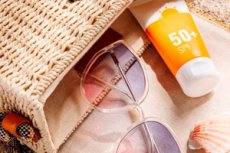New publications
Sunscreen does not interfere with vitamin D production
Last reviewed: 02.07.2025

All iLive content is medically reviewed or fact checked to ensure as much factual accuracy as possible.
We have strict sourcing guidelines and only link to reputable media sites, academic research institutions and, whenever possible, medically peer reviewed studies. Note that the numbers in parentheses ([1], [2], etc.) are clickable links to these studies.
If you feel that any of our content is inaccurate, out-of-date, or otherwise questionable, please select it and press Ctrl + Enter.

A debate has flared up on social media once again, this time over the use of sunscreen. The argument began when Tim Spector, professor of genetic epidemiology at King's College London, expressed concern that daily sunscreen use could lead to vitamin D deficiency.
While Spector’s post has caused quite a stir, it’s not the first time similar arguments against sunscreen have surfaced on social media — there are plenty of posts discussing the issue. Most of these concerns center on the fact that sunscreen blocks ultraviolet (UV) radiation, which is needed to synthesize vitamin D in the skin. Fortunately, research suggests that this is probably not an issue for most people.
Vitamin D is an essential nutrient. It helps regulate calcium absorption, which is important for bone health. A growing body of research also suggests that vitamin D may be important for other aspects of health, including boosting immunity, reducing inflammation, and maintaining heart health. However, more research is needed to confirm these findings.
While we can get vitamin D from certain foods, such as fatty fish, egg yolks, and fortified dairy products, our bodies rely primarily on sunlight to produce it in the skin.
When we are exposed to ultraviolet B (UVB) radiation, a series of processes occur in our skin cells that convert a cholesterol-like molecule into vitamin D3.
Since vitamin D production requires exposure to UVB radiation, it is reasonable to assume that sunscreen use interferes with vitamin D synthesis.
Sunscreen acts as a filter, absorbing or reflecting the sun's UV radiation. The higher the sun protection factor (SPF) of a product, the better it protects against sunburn (primarily caused by UVB radiation). By preventing this radiation from reaching and mutating DNA in skin cells, sunscreens can reduce the risk of skin cancer. Sunscreens have also been shown to reduce UV radiation-induced skin aging.
However, sunscreens do not provide 100% protection, largely because most people do not use them as directed. People typically apply only about a quarter to a third of the amount of sunscreen needed and rarely reapply it as directed. This means that some UVB still reaches the skin's surface.
Sunscreen and Vitamin D
Many studies have looked at the effects of sunscreen use on vitamin D levels. Overall, the results show that with typical use, sunscreen still allows you to produce adequate amounts of vitamin D.
In a study conducted by our research team, we conducted a week-long experiment on 40 holidaymakers in Tenerife, Spain. Participants were taught how to properly apply SPF 15 sunscreen to protect their skin.
Not only did sunscreen protect the participants from sunburn, it also improved their vitamin D levels. This showed that even with sunscreen, enough UVB radiation still reaches the skin to produce vitamin D.
These findings are consistent with two reviews that also looked at real-world sunscreen use and vitamin D levels.
Most of the studies included in these reviews either reported that sunscreen use did not affect vitamin D levels or that its use resulted in increased vitamin D levels. This was especially true for field studies, which best reflected sunscreen use and sun exposure in real-world settings.
However, these reviews also found several experimental studies (with more controlled conditions) that showed that sunscreen use may prevent vitamin D synthesis. However, these studies used UV sources that are not representative of solar UV radiation, which may limit their relevance to real-world findings.
Another limitation of the studies reviewed in these reviews was that most used low SPF sunscreens (around SPF 15 or lower). Public health recommendations suggest using sunscreen with an SPF of at least 30, which may potentially have a stronger inhibitory effect on vitamin D production.
And most of these studies included only white participants. White skin contains less melanin, which acts as a natural sunscreen, protecting against UV damage (including sunburn).
Melanin may also have a small inhibitory effect on vitamin D production. Observational studies consistently show that dark-skinned people tend to have lower vitamin D levels than light-skinned people living at the same latitude. This difference becomes even more pronounced at higher latitudes, where UVB radiation levels are lower.
One review also found that people with lighter skin types produce more vitamin D. However, this difference is likely due to differences in the methodology of the studies included in the review. Some used artificial light sources that do not represent the sun's UV radiation and may produce unrepresentative results.
More research is needed that includes people with darker skin types and uses sunscreens with higher SPF. But based on the available data, typical sunscreen use does not interfere with vitamin D production. It also has the added benefit of preventing harmful UV radiation.
Given that people with darker skin are at higher risk of vitamin D deficiency, spending more time in the sun may be beneficial. But while people with darker skin have a 20 to 60 times lower risk of skin cancer than people with lighter skin, it’s still important to avoid the sun when it’s strongest and to use sunscreen or cover up if you’re outdoors on sunny days.
